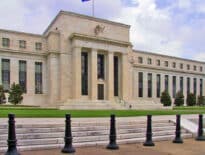
An illustration of the new coronavirus that causes the disease COVID-19. Image courtesy of the Centers for Disease Control.
Disruption to U.S. commercial real estate markets from the coronavirus outbreak will hit the hotel and retail industries hardest initially and cause supply chain disruptions that could affect the tech sector.
In a report issued Monday, brokerage Cushman & Wakefield said the spread of the virus that causes the illness COVID-19 is likely to pose challenges to hospitality markets and companies that rely on Chinese imports.
“The hotel sector is the industry most obviously impacted by the sharp decline in Asian tourism,” the report by economists Kevin Thorpe and Rebecca Rockey said. “The impact from COVID-19 is already tracking to be much worse [than SARS], as Chinese travel and tourism to the U.S. has come to virtual halt.”
The effect on property markets remains unclear, the report said, because commercial real estate’s fundamentals move at a slower pace than the stock market. Leasing activity may decline, but anticipated lower interest rates could spur more deal-making activity in capital markets.
“It is too soon to say what the office sector impact will be, but more caution and unique challenges for the tech industry specifically indicate that some leasing activity may be curtailed in the near term as firms grapple with larger supply chain issues,” the report states.
Citing reports that new cases in China have declined in recent weeks, the report said the stage is set for a recovery in the second half of the year, based upon the track record of previous infectious disease outbreaks.
Local Firms Acknowledge Risks
Office REIT Boston Properties acknowledged the risk to its financials in an annual report issued Monday, noting that coronavirus could disrupt its tenants’ businesses by disrupting supply chains and delaying transactions.
“In addition to the potential consequences listed above, these same factors may cause prospective tenants to delay their leasing decisions or choose to lease less space,” the report stated, adding that the potential impact remains difficult to predict.
U.S. businesses that rely heavily on Chinese imports have already reported the crisis is affecting their operations. Boston-based online furniture vendor Wayfair received just over half of its products from Chinese manufacturers. Close to 60 percent of Wayfair products were sourced from Chinese factories before new tariffs were imposed in 2018, prompting suppliers to shift some manufacturing to other countries.
“When you talk about the coronavirus, there’s no question that that creates supply-side disruptions,” CEO Niraj Shah said during a recent conference call on the company’s quarterly earnings.
In February, Wayfair laid off 3 percent of its workforce including 350 employees at its Back Bay headquarters as part of previously planned belt-tightening.
Wayfair has not adjusted its earnings guidance, which does not factor in “any significant potential disruption” from the virus, executives said.
“All of that said, we’re staying tightly aligned in our planning and coordination with our suppliers as we look to navigate this very fluid situation together,” Chief Financial Officer Michael Fleisher said during the call.
And Needham-based TripAdvisor said its financial results could be hurt by the outbreak, stating in its annual report Feb. 22 that the severity of the epidemic and its effects on travel behavior can’t yet be predicted.
Mitsubishi UFJ Financial Group said Monday the spread of the coronavirus could weaken the U.S. dollar and cause foreign investors to reduce U.S. investments.
At a media roundtable, Managing Director Kuniyuki Hirai said corporations and financial institutions may redirect investment to their home countries to prop up their own struggling economies.
MUFG is the world’s fifth-largest financial institution, with approximately $2.9 trillion in total assets including $343 billion at its MUFG Americas Holdings Corp.




 |
| 



